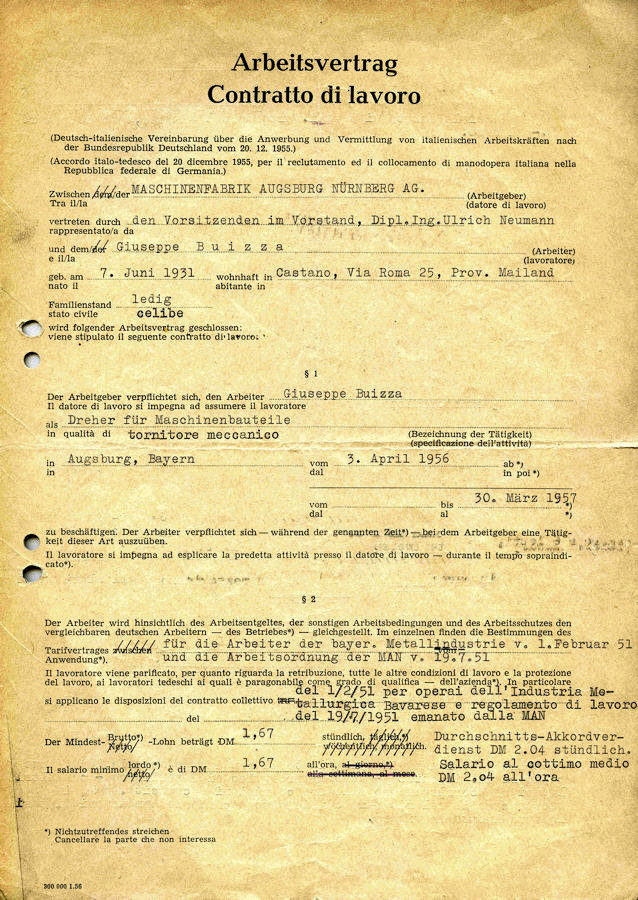Staunch European in Augsburg
Giuseppe Buizza (born in 1931) made the most momentous decision of his life when he lost his job as a metalworker in Italy in the mid-1950s: He applied for a job as a mechanic in Augsburg. On May 5, 1956, MAN offered him a one-year contract. Buizza signed immediately and went to Germany – as a “guest worker”. He had no idea that he would stay.
The Federal Republic of Germany and Italy concluded a labor recruitment agreement on December 20, 1955. Although it was initially intended for the recruitment of seasonal laborers in agriculture and the restaurant industry, the demand for labor was so great in the era of the “Wirtschaftswunder” that other sectors, primarily industry, were soon demanding labor placement. West Germany profited from its good image. Working conditions were significantly better than in Italy.
Giuseppe Buizza was born on June 7, 1931 in the small village of Marostico near Vicenza. Following his mother’s premature death, he grew up with his grandparents and in orphanages. He witnessed the air raids on Malpensa air base near Milan in 1944 and partisan warfare against the German occupiers. When a German soldier was shot and killed on the Milan-Novara railroad line, the SS retaliated and murdered three partisans. Once the war ended, Giuseppe Buizza found himself without having completed schooling and without having learned a trade. He went to a boarding school in Verona and completed a metalworker and lathe operator internship. He found work in Milan and in Lecce where he made film projectors, among other things.
Giuseppe Buizza was initially disappointed by the earning opportunities in Germany when he arrived in Augsburg in 1956. Whereas he had earned around € 400 in today’s currency in Italy, he earned just € 350 at MAN, including overtime. The work atmosphere, however, was much pleasanter than in Italy where he had been subjected to harassment by a “padrone”. Giuseppe Buizza saw his host country as an opportunity and strove to learn German as quickly as possible. He crammed vocabulary with a dictionary outside of work. But it took time. And it did not always go smoothly: Once, when he wanted to take the train from Augsburg to Munich and asked for a ticket to “Monaco”, he got a ticket to Monte Carlo for the horrendous price of DM 75!
Following an interlude in Switzerland, Buizza began working at Messerschmitt in Augsburg in 1958 and changed jobs several times before ultimately finding a job at Hoechst in Bobingen in 1963. Giuseppe Buizza worked as an interpreter there and later in the engineering unit. He was also able to contribute his own experiences as a “guest worker” and assisted his compatriots in everyday life. He taught German courses and was able to elucidate the intricacies of a German tax return, for instance. In their free time, the Italians met to play soccer. Evenings, they went dancing. Giuseppe Buizza has been retired since 1990– and still lives in Augsburg as a staunch European.
Sources/Literature: Eyewitness interview by the Haus der Bayerischen Geschichte (www.hdbg.eu/zeitzeugen)

